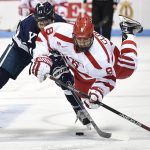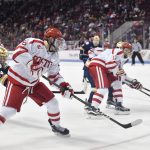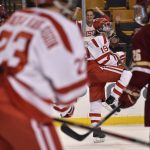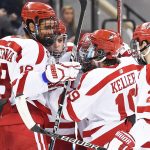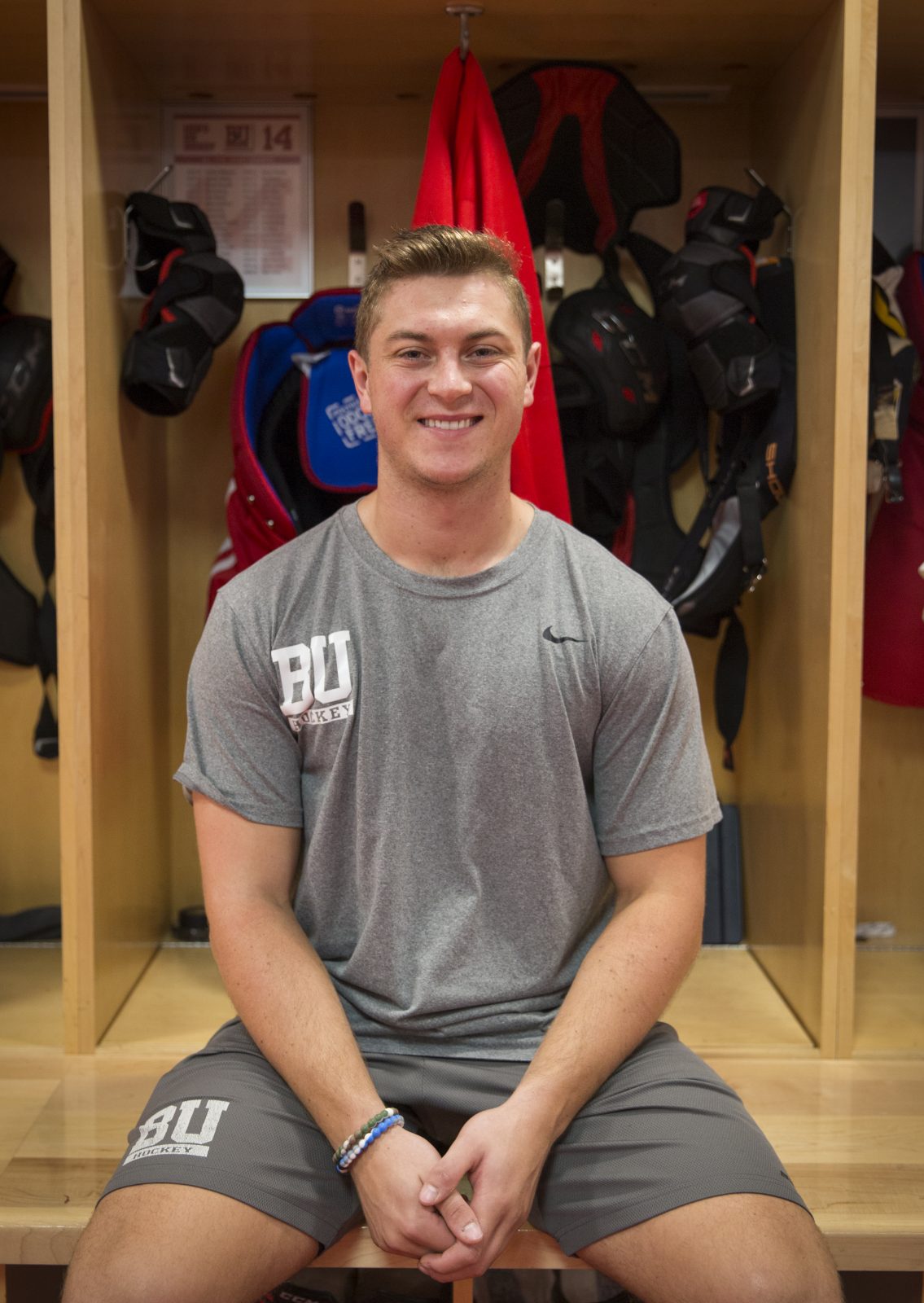
For Boston University hockey fans, it’s easy to pigeonhole Nikolas Olsson into one label. And nobody could mistake him, as he’ll be that winger in 2016-17 with an “A” emblazoned on his jersey playing full-tilt, full-time.
His head coach, David Quinn, and close friend and senior captain, Doyle Somerby, understand why that conclusion is reached so quickly, too. After all, Olsson’s best known for his physical style of play — his bone-crushing hits that swing momentum in BU’s favor. But they also insist that there’s something more complicated in the cards, that Olsson is no one-trick pony.
The extra layer is that Olsson, as Quinn put it, has a quick shot and soft hands, while Somerby said it’s easy to forget just how skilled the 22-year-old truly is. For some, that dose of sophistication is deep enough, but with Olsson there’s far more — a rollercoaster tale of coming back from season-ending surgery during his sophomore year.
“I actually went a few times to go see the sports psychologist here at BU, and when I realized my season was ending in January or February, it took a toll on me,” the soft-spoken San Diego native said. “It was really hard for me to stay positive and I went through a pretty dark time around then. I made it a point to put it in my head that I’d be good to go in four months and be better than I’ve ever been. Just that I’d be completely 100 percent for the first time in years.”
His 2015-16 season was over before it truly began.
He appeared in only 14 of the Terriers’ 39 games, halted by a nagging right shoulder injury that has plagued him since surgery at age 15. Almost nonchalantly, Olsson explained his socket was loose, causing his shoulder to pop in and out. So he’d play a few games, be sidelined for a few more, come back and then rinse and repeat. He even skated with a brace that kept his right arm stiff and rigid.
Eventually the cycle became too much, causing Olsson to call it quits and have Thomas Francis Holovacs, a Boston-area surgeon and team physician for the Boston Red Sox, clean up the problem for good. Now Olsson is at 100 percent health, but the road back wasn’t smooth sailing.
Because his home state of California is so far away, Olsson didn’t always have someone to lean on, Somerby said. So the defenseman would go out of his way to ensure his buddy was in good spirits, and in the rare occasion Olsson’s family was around — like when they swung through to the University of Notre Dame away trip in February — he still faced many tough times.
“We were all leaving the next morning and going and grabbing a meal, and Nik’s having to sit back while he’s in a room fresh off surgery, trying to play Xbox, can’t move his arm. That was hard,” Somerby recalled. “We’re going to the playoffs and all happy and excited. Then watching him know what we were going into and that he couldn’t be a part of it was definitely tough to watch.”
The emotional toll, understandably, was something Olsson struggled with at times. When the injuries would come and go, he used to wonder, “How long will it be this time? Here it goes again.” But last year, he caught himself pondering questions far more personal: Would he put on weight? Would he stop being an athlete? Would the pain really go away?
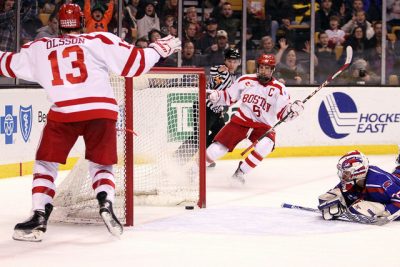
“A week and a half out of surgery I was still in my sling and I was riding the bike, I was doing the stairmaster and what have you, just trying to do whatever I could to stay a little bit in shape,” Olsson said. “I didn’t just didn’t want to be left out of everything.”
But Olsson was missing out, helplessly watching games from afar. And such circumstances left Somerby reflecting on how much Olsson was missed, especially as BU’s 2015-16 season ended on a sour note when the University of Massachusetts Lowell bounced them from the Hockey East Tournament, and the University of Denver did the same in the first round of the NCAA Tournament.
Olsson, however, never imagined his presence would be so sorely missed. When he arrived on BU’s campus for the 2014-15 season, he just pictured being a practice player, maybe making the gameday roster on occasion. But his physical style became invaluable, serving as the proverbial yin to the yang of his skilled teammates.
So with Olsson tackling rehab head on, the Terriers suffered.
“There’s a lot of ups and downs in college hockey, and that’s probably the biggest adjustment to the game — getting the atmosphere for every game,” Somerby said. “Nik is definitely someone we look at where when he lays hits like that and does the things he does and skates with the energy, it brings everyone else up. When you don’t have that, it’s tough.”
If all goes to according to plan though, those tough times Olsson and Somerby candidly spoke about should be permanently in the rearview mirror. And while Olsson admitted it’ll take a few shifts for him to feel like his old self again, he has a greater appreciation of the life he leads every day.
He’s an assistant captain as a junior — an honor he humbly downplays — and Quinn said he firmly believes the best Nik Olsson is still yet to come.
“I know Nik’s time has been hard, but what he went through last year is worth it for him,” Quinn said. “There’s a piece of mind in the sense he’s never felt healthier, he’s excited about the upcoming season. And that’s the hard part about being out: it’s not the physical pain, it’s the emotional pain you suffer. He went through some tough times and is a better player for it now.”
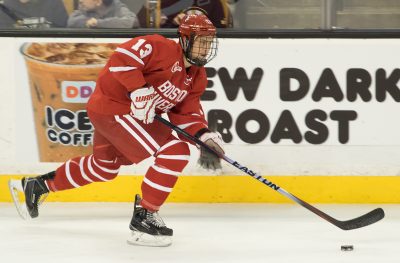
Above all, Olsson has grown, stressing that adversity has made him stronger. He said he’s one of the lucky few throughout the country who gets to play for BU, and said nobody can ever take that fact away from him.
Even in the harsh reality of sports — where every athlete is one injury away from having to call it quits — Olsson maintains the mature perspective that he’s become a better version of himself.
“Obviously nobody wants the downs, but they’re going to come regardless and nobody has a perfect season,” Olsson said. “Everyone faces adversity and I think that matures you as a person and as a player. I think that gives you more strength mentally so that when adversity comes in the future, you know you’ve gone through it before and you can go through it again. It’s a really good thing to have that all happen.”
And while nobody quite knows what the future has in store for Olsson, one truth remains clear: he’s healthy, he’s back and he’s ready to go.
“I’m just glad that I have my health, and even if I do have a banged up shoulder, I still have my health,” Olsson said. “I sort of look at the big picture [and] don’t take things for granted so much. For me, I’m just thankful every time I can come to the rink and do a full-body workout or go on the ice and practice with my team. I really feel blessed to be here.”
Jonathan's a New Englander who writes about sports, features and politics. He currently covers men's hockey at BU, worked as Sports Editor during the spring 2016 semester and is on the FreeP's Board of Directors. Toss him a follow on Twitter at @jonathansigal.

